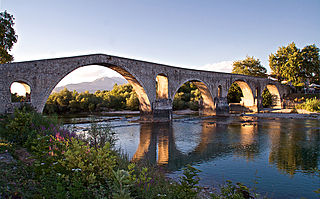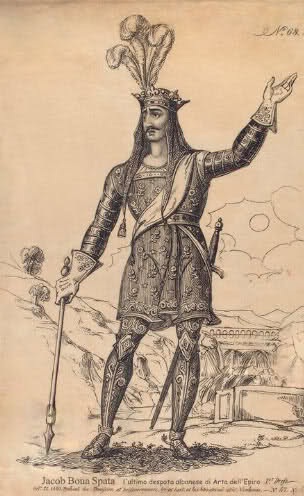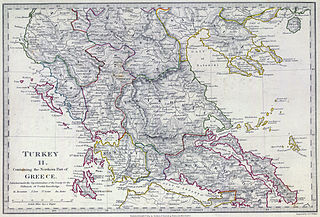Related Research Articles

The Despotate of Epirus was one of the Greek successor states of the Byzantine Empire established in the aftermath of the Fourth Crusade in 1204 by a branch of the Angelos dynasty. It claimed to be the legitimate successor of the Byzantine Empire, along with the Empire of Nicaea and the Empire of Trebizond, its rulers briefly proclaiming themselves as Emperors in 1227–1242. The term "Despotate of Epirus" is, like "Byzantine Empire" itself, a modern historiographic convention and not a name in use at the time.
The despot of Epirus was the ruler of the Despotate of Epirus, one of the successor states of the Byzantine Empire in the aftermath of the Fourth Crusade. The name "Despotate of Epirus" and the title "despot of Epirus" are modern historiographical names, and were not in use by the despots themselves. In the Byzantine Empire, the title of despot was a prestigious court title and did not designate rule over some specific territory. Though several of the early Greek rulers of the Epirote realm did use the title of despot, it was never in reference to the lands they governed, but instead in reference to their position in the imperial hierarchy.

Arta is a city in northwestern Greece, capital of the regional unit of Arta, which is part of Epirus region. The city was known in ancient times as Ambracia. Arta is known for the medieval bridge over the Arachthos River. Arta is also known for its ancient sites from the era of Pyrrhus of Epirus and its well-preserved 13th-century castle. Arta's Byzantine history is reflected in its many Byzantine churches; perhaps the best known is the Panagia Paregoretissa, built about 1290 by Despot Nikephoros I Komnenos Doukas.

Theodore II Palaiologos or Palaeologus was Despot in the Morea from 1407 to 1443 and in Selymbria from then until his death.

Simeon Uroš, nicknamed Siniša (Синиша), was a self-proclaimed Emperor of Serbs and Greeks, from 1356 to 1370. He was son of Serbian King Stephen Uroš III and Byzantine Princess Maria Palaiologina. Initially, he was awarded the title of despot in 1346, and appointed governor of southern Epirus and Acarnania in 1347 by his half-brother, Serbian Emperor Stephen Dušan. After Dušan's death in 1355, the Serbian throne passed to Dušan's son Stephen Uroš V, but despot Simeon decided to seize the opportunity in order to impose himself as co-ruler and lord of all southern provinces of the Serbian Empire. That led him to conflict with his nephew in 1356, when Simeon started to expand his control in southern regions of the Empire, trying to take Thessaly and Macedonia. He proclaimed himself Emperor of the Serbs and Greeks, creating a separate state, centered in regions of Thessaly and Epirus, where he ruled until his death in 1370. He was succeeded by his son Jovan Uroš.
Esau de' Buondelmonti was the ruler of Ioannina and its surrounding area from 1385 until his death in 1411, with the Byzantine title of Despot.
Carlo I Tocco was the hereditary Count palatine of Cephalonia and Zakynthos from 1376, and ruled as the Despot of Epirus from 1411 until his death on July 4, 1429.
Leonardo III Tocco was the last ruler of the Despotate of Epirus, ruling from the death of his father Carlo II Tocco in 1448 to the despotate's fall to the Ottoman Empire in 1479. Leonardo was one of the last independent Latin rulers in Greece, and the last to hold territories on the Greek mainland. After the fall of his realm, he fled to Italy, where he became a landowner and diplomat. Leonardo continued to claim his titles in exile until his death.

The County Palatine of Cephalonia and Zakynthos existed from 1185 to 1479 as part of the Kingdom of Sicily. The title and the right to rule the Ionian islands of Cephalonia and Zakynthos was originally given to Margaritus of Brindisi for his services to William II, King of Sicily, in 1185.
Theodora Tocco was the first wife of Constantine Palaiologos while he was Despot of Morea. Her husband would become the last Emperor of the Eastern Roman Empire.

Yaqub Spata or Shpata was the last Lord of Arta, ruling from 1414/15 until 1416, with a brief interval when he was evicted by the local population. His rule ended after his capture and execution by Carlo I Tocco, who proceeded to incorporate Arta to his domains.

The House of Tocco was an Italian noble family from Benevento that came to prominence in the late 14th and 15th centuries, when they ruled various territories in western Greece as Counts Palatine of Cephalonia and Zakynthos and Despots of Epirus. During their brief period of rule in Greece, they were one of the most ambitious and able Latin dynasties in the region, and they were one of the few to leave descendants lasting until modern times.
Leonardo I Tocco was the count palatine of the islands of Cephalonia and Zakynthos from 1357 until his death, and later lord of Ithaca, Lefkada, and the port of Vonitsa as well.

The Battle of the Echinades was fought in 1427 among the Echinades islands off western Greece between the fleets of Carlo I Tocco and the Byzantine Empire. The battle was a decisive Byzantine victory, the last in the Empire's naval history, and led to the consolidation of the Peloponnese under the Byzantine Despotate of the Morea.

Karli-Eli, also Karli-Ili or Karlo-Ili, was the Ottoman name for the region of Aetolia-Acarnania in western Greece, which formed a distinct administrative unit from the late 15th century until the Greek War of Independence.
Leonardo II Tocco was a scion of the Tocco family and lord of Zakynthos, who played an important role as a military leader for his brother, Carlo I Tocco, in early 15th-century western Greece.
Carlo III Tocco (1464–1518) was the titular despot of Epirus and count palatine of Cephalonia and Zakynthos from the death of his father Leonardo III Tocco c. 1503 to his own death in 1518. Carlo lived in Rome, where he received pensions from both the Papacy and the Kingdom of Naples. As an adult, Carlo worked as a military officer, serving both the Papacy and Emperor Maximilian I.
Milica Branković was a Serbian princess and the first wife of Leonardo III Tocco, whom she married on 1 May 1463. She was a daughter of despot Lazar Branković of Serbia and Helena Palaiologina. Milica died in childbirth in 1464, while giving birth to Carlo III Tocco. Carlo III Tocco succeeded his father as titular ruler of Epirus (Arta) and Zakynthos. Her siblings were Maria, wife of King Stephen Tomašević of Bosnia and Jerina, wife of Gjon Kastrioti II.
Since its fall, the issue of succession to the Byzantine Empire has been a major point of contention both geopolitically, with different states laying claim to the legacy and inheritance of the Byzantine Empire, and among the surviving members of the Byzantine nobility and their descendants. Historically, the most prominent claims have been those of the Ottoman Empire, which conquered Byzantium in 1453 and ruled from its former capital, Constantinople; the Russian Empire, as the most powerful state practising Eastern Orthodox Christianity; and various nobles and figures in Western Europe of increasingly spurious and questionable imperial descent.
Don Antonio Tocco was the last titular Despot of Epirus and Count Palatine of Cephalonia and Zakynthos, claiming these titles from the death of his father Leonardo V Tocco in 1641 until he abandoned them in 1642, substituting them for the title of Prince of Achaea, which he used until his death in 1678.
References
- ↑ PLP, 26524. Σπάτας Μουρίκης.
- ↑ Nicol 1984, p. 255.